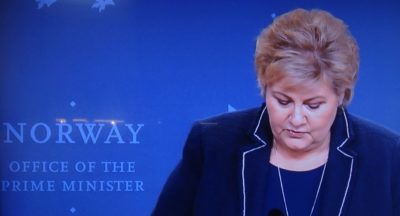NEWS ANALYSIS: Sylvi Listhaug, one of Norway’s most controversial and provocative politicians, took over as oil minister on Wednesday. Listhaug, who earlier has questioned whether people are to blame for climate change, was clearly tapped by her Progress Party leader Siv Jensen to fend off “shame” over Norway’s oil industry and push for more Arctic exploration.

Prime Minister Erna Solberg announced at a midday press conference that Listhaug will take over for the Progress Party’s Kjell-Børge Freiberg, who has received poor reviews after 18 months in the post. On the day before Solberg’s announcement, newspaper Dagsavisen had given the jovial high-school graduate from Vesterålen a score of just “2” on a scale from one to six. “While the young are screaming for oil cuts and a future,” Dagsavisen wrote, Freiberg has pushed for “more oil drilling than ever before.”
Listhaug is likely to do the same, as Freiberg returns to his seat in Parliament, but from a position of greater authority within their party. She’s known as an outspoken and offensive champion of her party’s platform, sometimes at odds with the government’s platform. The party has also lost lots of voter support in the past year. It’s part of Listhaug’s job to try to woo them back, even though critics claim she’s part of the reason for the voter flight, not least as climate activism rises.
Listhaug has drawn plenty of fire over her provocative defense of highly restrictive immigration policy and opposition to helping boat refugees in the Mediterranean. She ultimately had to resign as justice minister, after wrongly accusing the Labour Party of being soft on terrorism, and was exiled back to Parliament until Jensen allowed her return to government. Dagsavisen gave her a score of just “1,” however, for her most recent performance as government minister in charge of public health and elder care.

That vacated post has now been assumed by Listhaug’s fellow deputy leader of the Progress Party, Terje Søviknes. He’d held the oil minister’s post just prior to Freiberg, but stepped down last year citing a desire to spend more time with his family outside Bergen. He was also needed, however, to campaign for the party in local elections and had been favoured to win a top local post, only to see the Progress Party lose badly in the September election. Søviknes was suddenly out of a top political job in one of the party’s most important constituencies.
Prime Minister Solberg claimed on Wednesday that the cabinet changes were prompted by the Progress Party’s desire to now have both of its deputy leaders in the government, not least as it gears up for next year’s parliamentary election. It wasn’t entirely clear why Søviknes didn’t simply replace Freiberg and resume his duties as oil minister, but it’s widely viewed that Listhaug was tapped because she’s tough, likely to get along well with equally tough oil industry officials, keen to defend Norway’s oil and gas industry from climate activists, and has an uncanny ability to grab attention.

Solberg’s four-party government coalition also has to agree this winter on how far north oil drilling in the Arctic should be allowed. Since the Arctic ice is already melting at a rapid pace, the Progress Party will argue that the so-called “ice edge” (from which oil drilling is supposed to be kept at a distance) will move farther north. The Liberal Party, which is far more concerned with climate and environmental issues than Progress, will vigorously argue to keep the ice edge border where it is or move it farther south. Given all the climate pressure on Solberg’s government, that view ultimately may prevail, with Listhaug then likely to be better able to explain such a compromise to her party than Søviknes or certainly Freiberg would.
Asked whether Solberg thinks she’ll be able to hold her increasingly weary government coalition together, not least given the high level of conflict between Progress and the Liberals, she gave a rare one-word answer: “Yes!”
Solberg, who leads Norway’s Conservative Party, also insisted that Wednesday’s cabinet changes were “not made first and foremost to generate enthusiasm” in her government but rather were made at Progress’ initiative. She’d admitted to some government weariness at her pre-Christmas press conference the day before.
“I think this will all go fine,” she said, calling both Listhaug and Søviknes “very good government ministers.” She even claimed that Listhaug is no longer in denial over climate change. Listhaug may, however, prove to be the final nail in the Solberg government’s coffin, detracting further from whatever climate credibility it has left just days after the most recent UN climate summit adjourned with no firm agreement on how to cut emissions and save the planet.
newsinenglish.no/Nina Berglund

